A Detailed Book Review of George Orwell's The Road to Wigan Pier
VerifiedAdded on 2023/01/05
|11
|3617
|52
Report
AI Summary
This report provides a comprehensive review of George Orwell's 'The Road to Wigan Pier'. It begins with an introduction outlining the paper's objectives and structure, followed by a discussion of the book's historical context, focusing on the economic and social conditions of Northern England in the 1930s, particularly the impact of the Great Depression on the working class and the author's perspective. The review delves into Orwell's background, exploring his life experiences and other works that shaped his views, especially his support for democratic socialism and his criticism of social inequalities. The methodology employed by Orwell, characterized as an experimental ethnographic study, is examined, highlighting his use of participant observation and face-to-face interviews to gather firsthand data on the lives of coal miners and the working class. The report summarizes the book's content, including Orwell's observations on poverty, unemployment, housing conditions, and the daily struggles of the working class. The review concludes with an assessment of the book's significance and lasting legacy, considering its impact on readers and its contribution to social commentary. Critical analysis is integrated throughout, evaluating Orwell's arguments and perspectives, and considering the book's strengths and potential biases.
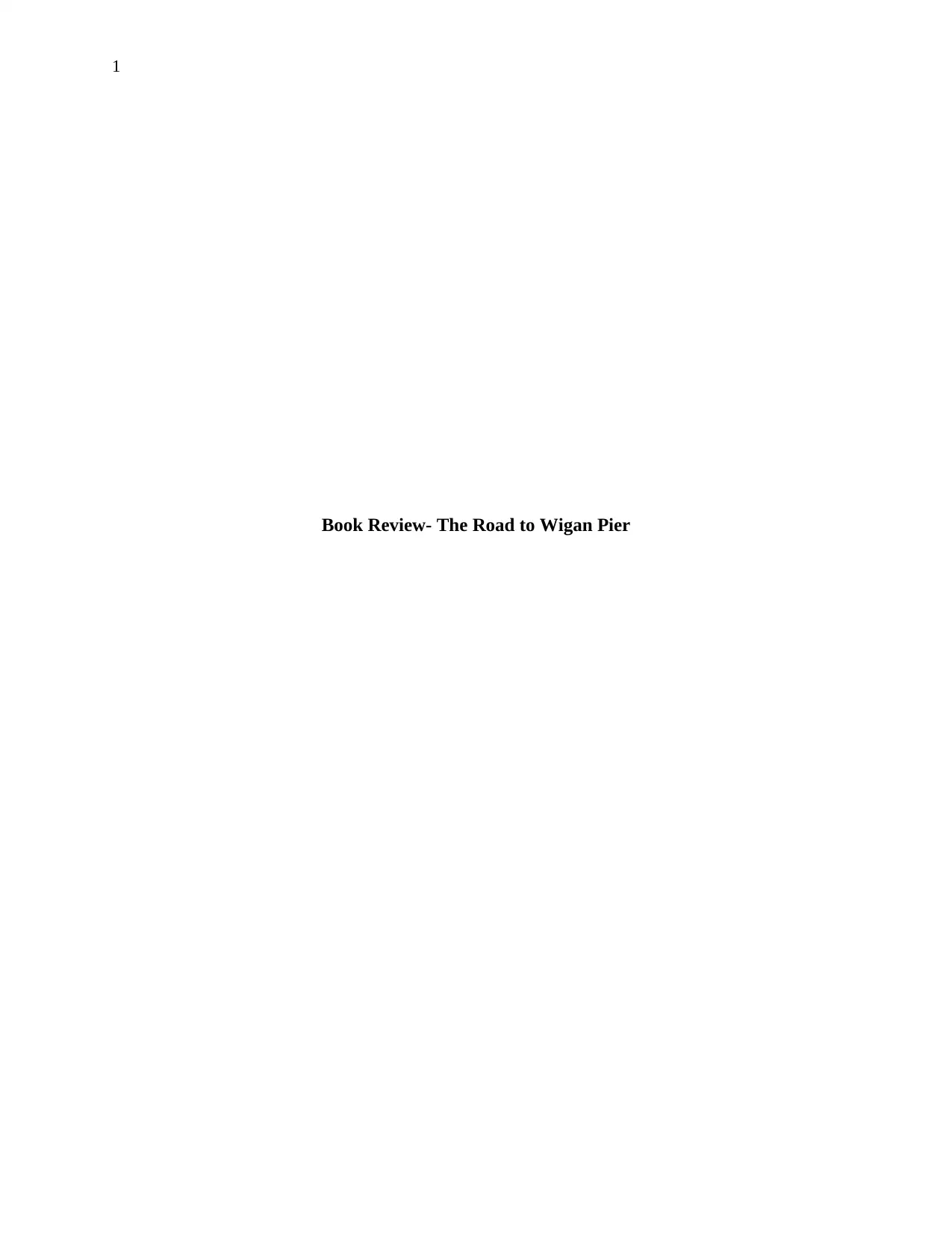
1
Book Review- The Road to Wigan Pier
Book Review- The Road to Wigan Pier
Paraphrase This Document
Need a fresh take? Get an instant paraphrase of this document with our AI Paraphraser
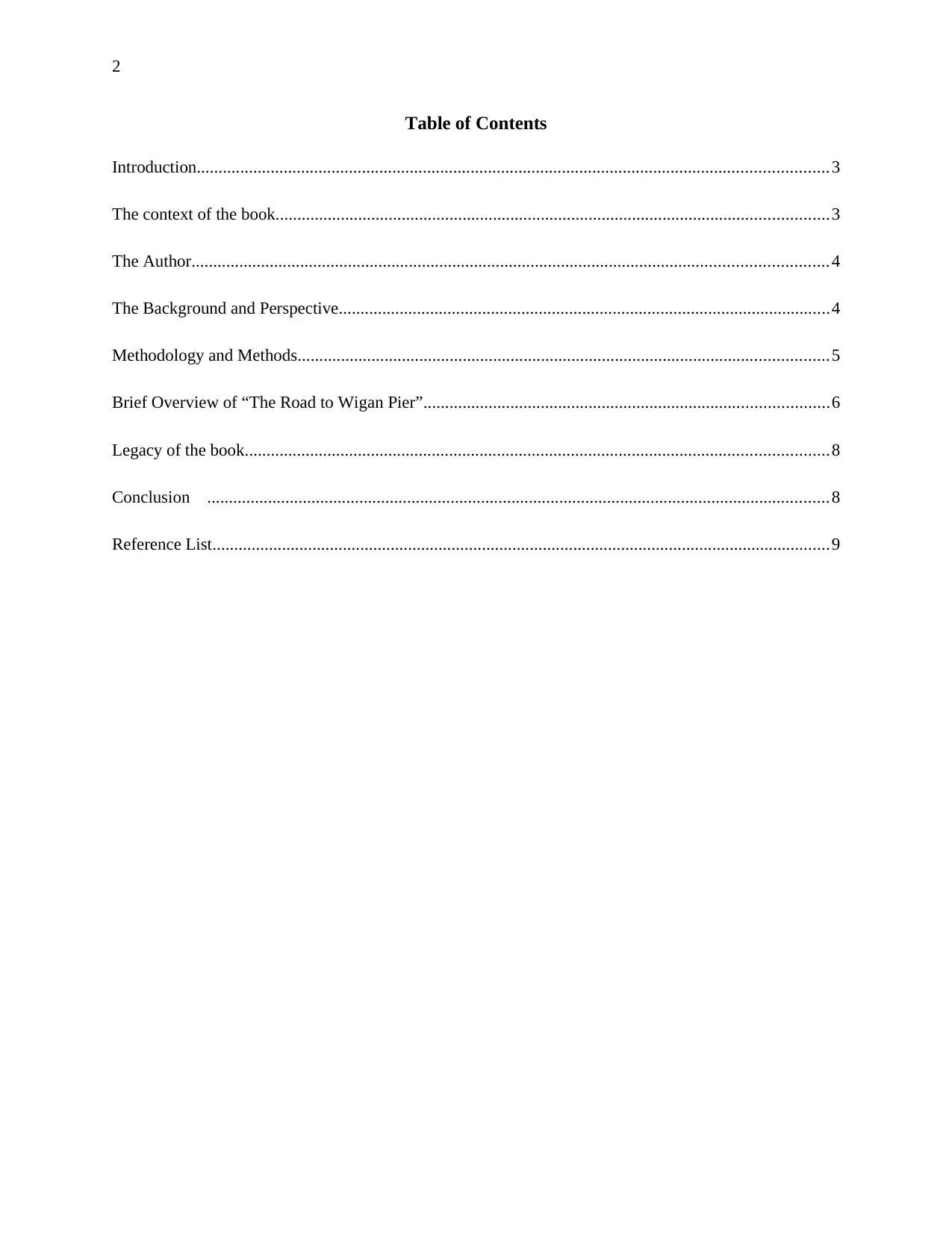
2
Table of Contents
Introduction.................................................................................................................................................3
The context of the book...............................................................................................................................3
The Author..................................................................................................................................................4
The Background and Perspective.................................................................................................................4
Methodology and Methods..........................................................................................................................5
Brief Overview of “The Road to Wigan Pier”.............................................................................................6
Legacy of the book......................................................................................................................................8
Conclusion ...............................................................................................................................................8
Reference List..............................................................................................................................................9
Table of Contents
Introduction.................................................................................................................................................3
The context of the book...............................................................................................................................3
The Author..................................................................................................................................................4
The Background and Perspective.................................................................................................................4
Methodology and Methods..........................................................................................................................5
Brief Overview of “The Road to Wigan Pier”.............................................................................................6
Legacy of the book......................................................................................................................................8
Conclusion ...............................................................................................................................................8
Reference List..............................................................................................................................................9
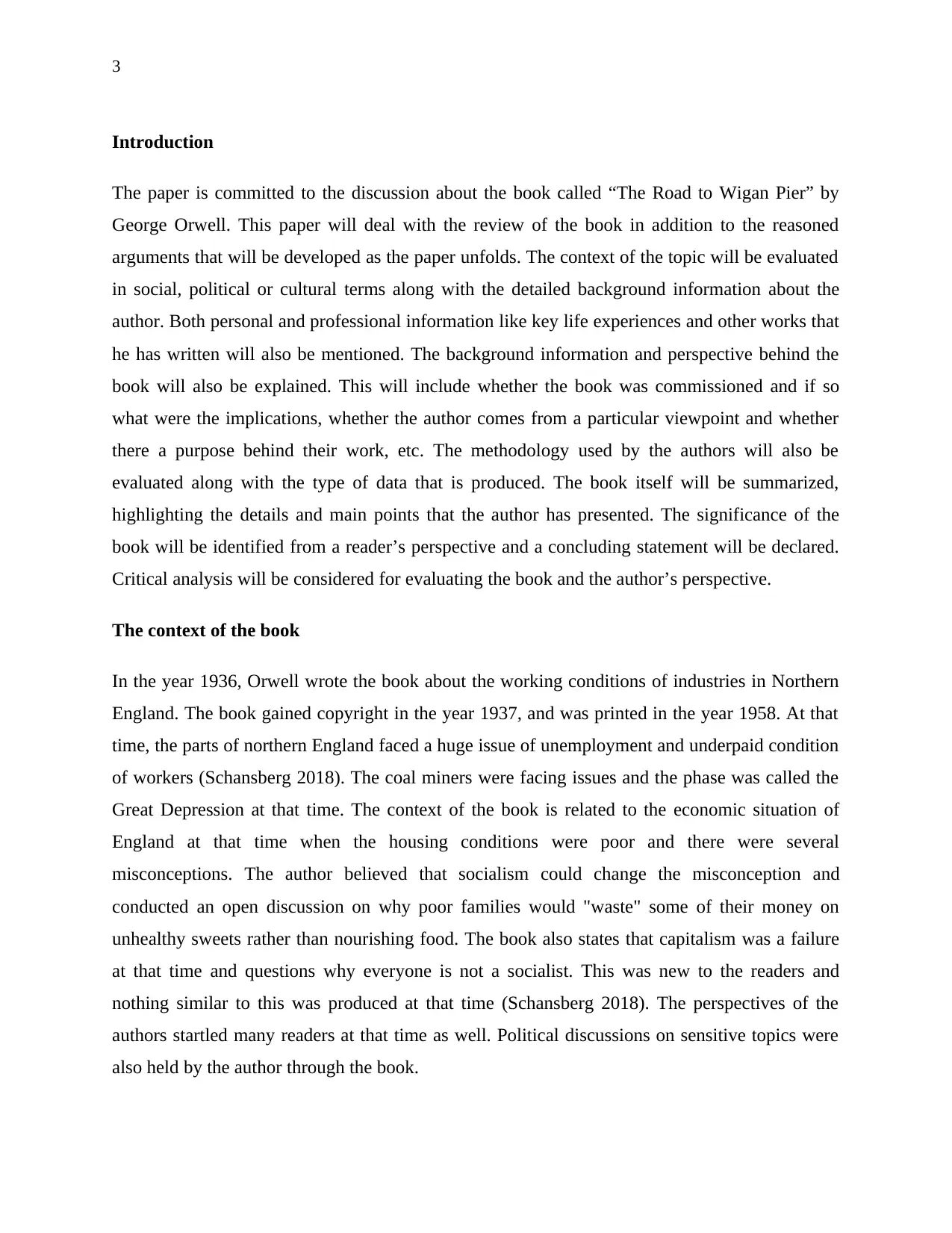
3
Introduction
The paper is committed to the discussion about the book called “The Road to Wigan Pier” by
George Orwell. This paper will deal with the review of the book in addition to the reasoned
arguments that will be developed as the paper unfolds. The context of the topic will be evaluated
in social, political or cultural terms along with the detailed background information about the
author. Both personal and professional information like key life experiences and other works that
he has written will also be mentioned. The background information and perspective behind the
book will also be explained. This will include whether the book was commissioned and if so
what were the implications, whether the author comes from a particular viewpoint and whether
there a purpose behind their work, etc. The methodology used by the authors will also be
evaluated along with the type of data that is produced. The book itself will be summarized,
highlighting the details and main points that the author has presented. The significance of the
book will be identified from a reader’s perspective and a concluding statement will be declared.
Critical analysis will be considered for evaluating the book and the author’s perspective.
The context of the book
In the year 1936, Orwell wrote the book about the working conditions of industries in Northern
England. The book gained copyright in the year 1937, and was printed in the year 1958. At that
time, the parts of northern England faced a huge issue of unemployment and underpaid condition
of workers (Schansberg 2018). The coal miners were facing issues and the phase was called the
Great Depression at that time. The context of the book is related to the economic situation of
England at that time when the housing conditions were poor and there were several
misconceptions. The author believed that socialism could change the misconception and
conducted an open discussion on why poor families would "waste" some of their money on
unhealthy sweets rather than nourishing food. The book also states that capitalism was a failure
at that time and questions why everyone is not a socialist. This was new to the readers and
nothing similar to this was produced at that time (Schansberg 2018). The perspectives of the
authors startled many readers at that time as well. Political discussions on sensitive topics were
also held by the author through the book.
Introduction
The paper is committed to the discussion about the book called “The Road to Wigan Pier” by
George Orwell. This paper will deal with the review of the book in addition to the reasoned
arguments that will be developed as the paper unfolds. The context of the topic will be evaluated
in social, political or cultural terms along with the detailed background information about the
author. Both personal and professional information like key life experiences and other works that
he has written will also be mentioned. The background information and perspective behind the
book will also be explained. This will include whether the book was commissioned and if so
what were the implications, whether the author comes from a particular viewpoint and whether
there a purpose behind their work, etc. The methodology used by the authors will also be
evaluated along with the type of data that is produced. The book itself will be summarized,
highlighting the details and main points that the author has presented. The significance of the
book will be identified from a reader’s perspective and a concluding statement will be declared.
Critical analysis will be considered for evaluating the book and the author’s perspective.
The context of the book
In the year 1936, Orwell wrote the book about the working conditions of industries in Northern
England. The book gained copyright in the year 1937, and was printed in the year 1958. At that
time, the parts of northern England faced a huge issue of unemployment and underpaid condition
of workers (Schansberg 2018). The coal miners were facing issues and the phase was called the
Great Depression at that time. The context of the book is related to the economic situation of
England at that time when the housing conditions were poor and there were several
misconceptions. The author believed that socialism could change the misconception and
conducted an open discussion on why poor families would "waste" some of their money on
unhealthy sweets rather than nourishing food. The book also states that capitalism was a failure
at that time and questions why everyone is not a socialist. This was new to the readers and
nothing similar to this was produced at that time (Schansberg 2018). The perspectives of the
authors startled many readers at that time as well. Political discussions on sensitive topics were
also held by the author through the book.
⊘ This is a preview!⊘
Do you want full access?
Subscribe today to unlock all pages.

Trusted by 1+ million students worldwide
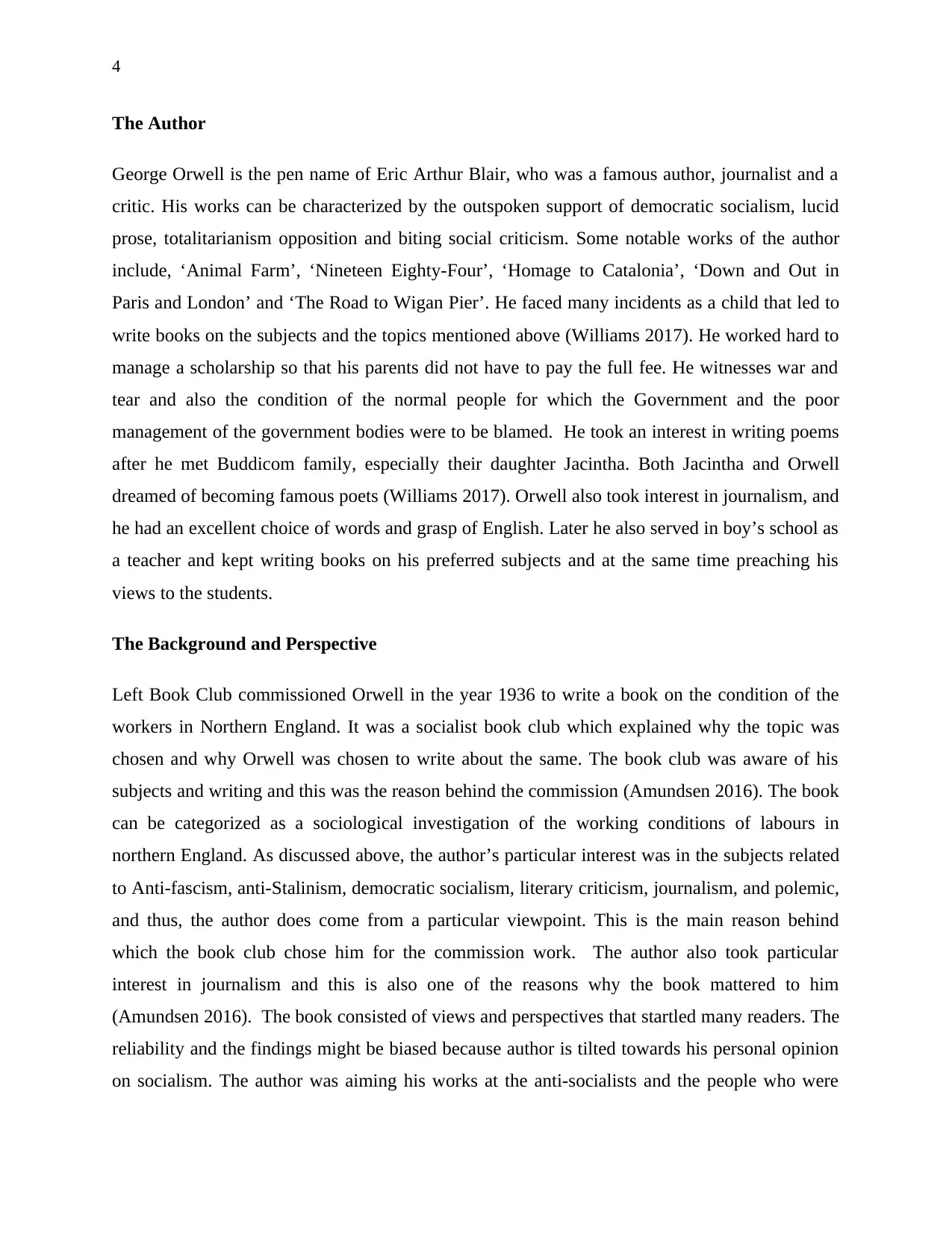
4
The Author
George Orwell is the pen name of Eric Arthur Blair, who was a famous author, journalist and a
critic. His works can be characterized by the outspoken support of democratic socialism, lucid
prose, totalitarianism opposition and biting social criticism. Some notable works of the author
include, ‘Animal Farm’, ‘Nineteen Eighty-Four’, ‘Homage to Catalonia’, ‘Down and Out in
Paris and London’ and ‘The Road to Wigan Pier’. He faced many incidents as a child that led to
write books on the subjects and the topics mentioned above (Williams 2017). He worked hard to
manage a scholarship so that his parents did not have to pay the full fee. He witnesses war and
tear and also the condition of the normal people for which the Government and the poor
management of the government bodies were to be blamed. He took an interest in writing poems
after he met Buddicom family, especially their daughter Jacintha. Both Jacintha and Orwell
dreamed of becoming famous poets (Williams 2017). Orwell also took interest in journalism, and
he had an excellent choice of words and grasp of English. Later he also served in boy’s school as
a teacher and kept writing books on his preferred subjects and at the same time preaching his
views to the students.
The Background and Perspective
Left Book Club commissioned Orwell in the year 1936 to write a book on the condition of the
workers in Northern England. It was a socialist book club which explained why the topic was
chosen and why Orwell was chosen to write about the same. The book club was aware of his
subjects and writing and this was the reason behind the commission (Amundsen 2016). The book
can be categorized as a sociological investigation of the working conditions of labours in
northern England. As discussed above, the author’s particular interest was in the subjects related
to Anti-fascism, anti-Stalinism, democratic socialism, literary criticism, journalism, and polemic,
and thus, the author does come from a particular viewpoint. This is the main reason behind
which the book club chose him for the commission work. The author also took particular
interest in journalism and this is also one of the reasons why the book mattered to him
(Amundsen 2016). The book consisted of views and perspectives that startled many readers. The
reliability and the findings might be biased because author is tilted towards his personal opinion
on socialism. The author was aiming his works at the anti-socialists and the people who were
The Author
George Orwell is the pen name of Eric Arthur Blair, who was a famous author, journalist and a
critic. His works can be characterized by the outspoken support of democratic socialism, lucid
prose, totalitarianism opposition and biting social criticism. Some notable works of the author
include, ‘Animal Farm’, ‘Nineteen Eighty-Four’, ‘Homage to Catalonia’, ‘Down and Out in
Paris and London’ and ‘The Road to Wigan Pier’. He faced many incidents as a child that led to
write books on the subjects and the topics mentioned above (Williams 2017). He worked hard to
manage a scholarship so that his parents did not have to pay the full fee. He witnesses war and
tear and also the condition of the normal people for which the Government and the poor
management of the government bodies were to be blamed. He took an interest in writing poems
after he met Buddicom family, especially their daughter Jacintha. Both Jacintha and Orwell
dreamed of becoming famous poets (Williams 2017). Orwell also took interest in journalism, and
he had an excellent choice of words and grasp of English. Later he also served in boy’s school as
a teacher and kept writing books on his preferred subjects and at the same time preaching his
views to the students.
The Background and Perspective
Left Book Club commissioned Orwell in the year 1936 to write a book on the condition of the
workers in Northern England. It was a socialist book club which explained why the topic was
chosen and why Orwell was chosen to write about the same. The book club was aware of his
subjects and writing and this was the reason behind the commission (Amundsen 2016). The book
can be categorized as a sociological investigation of the working conditions of labours in
northern England. As discussed above, the author’s particular interest was in the subjects related
to Anti-fascism, anti-Stalinism, democratic socialism, literary criticism, journalism, and polemic,
and thus, the author does come from a particular viewpoint. This is the main reason behind
which the book club chose him for the commission work. The author also took particular
interest in journalism and this is also one of the reasons why the book mattered to him
(Amundsen 2016). The book consisted of views and perspectives that startled many readers. The
reliability and the findings might be biased because author is tilted towards his personal opinion
on socialism. The author was aiming his works at the anti-socialists and the people who were
Paraphrase This Document
Need a fresh take? Get an instant paraphrase of this document with our AI Paraphraser
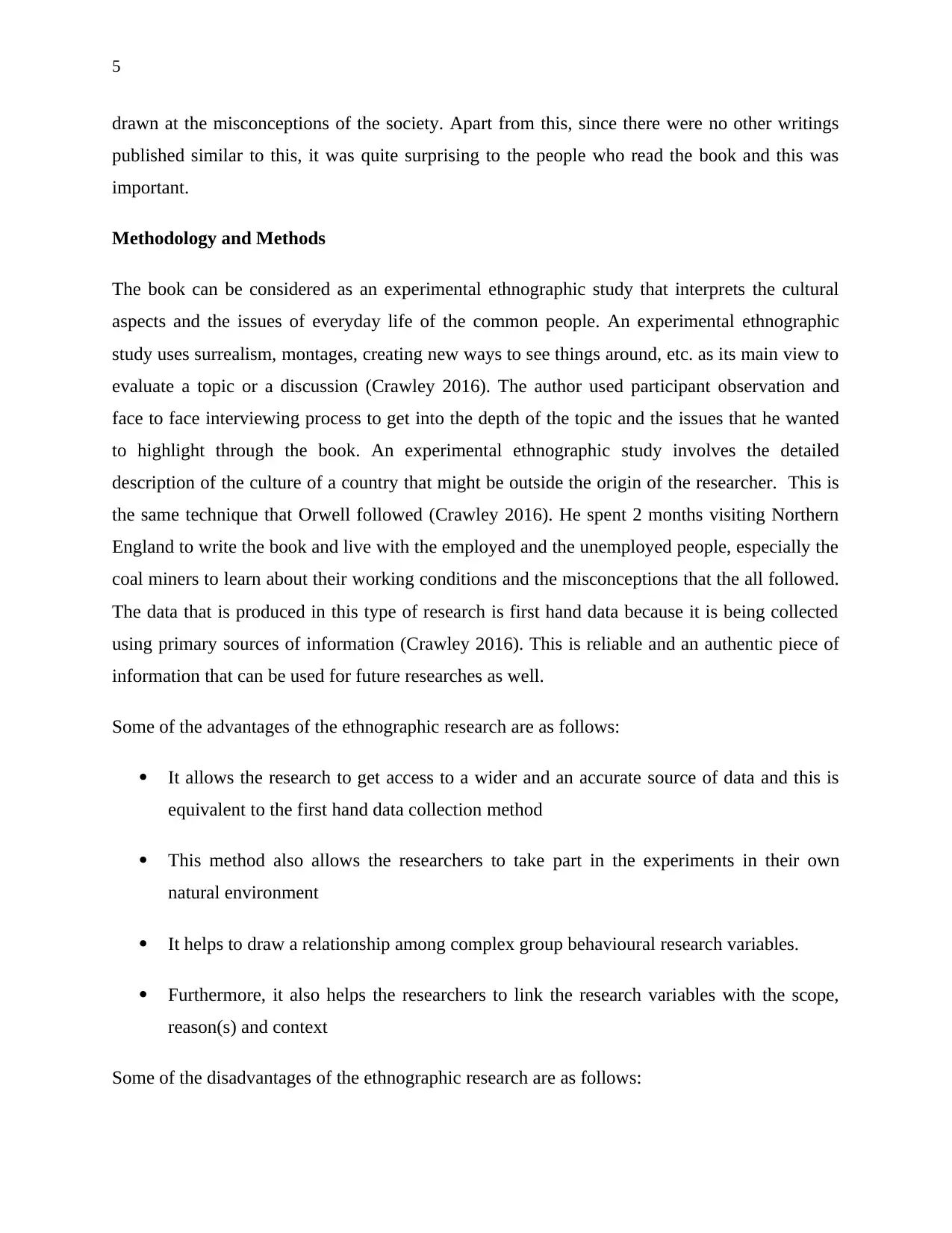
5
drawn at the misconceptions of the society. Apart from this, since there were no other writings
published similar to this, it was quite surprising to the people who read the book and this was
important.
Methodology and Methods
The book can be considered as an experimental ethnographic study that interprets the cultural
aspects and the issues of everyday life of the common people. An experimental ethnographic
study uses surrealism, montages, creating new ways to see things around, etc. as its main view to
evaluate a topic or a discussion (Crawley 2016). The author used participant observation and
face to face interviewing process to get into the depth of the topic and the issues that he wanted
to highlight through the book. An experimental ethnographic study involves the detailed
description of the culture of a country that might be outside the origin of the researcher. This is
the same technique that Orwell followed (Crawley 2016). He spent 2 months visiting Northern
England to write the book and live with the employed and the unemployed people, especially the
coal miners to learn about their working conditions and the misconceptions that the all followed.
The data that is produced in this type of research is first hand data because it is being collected
using primary sources of information (Crawley 2016). This is reliable and an authentic piece of
information that can be used for future researches as well.
Some of the advantages of the ethnographic research are as follows:
It allows the research to get access to a wider and an accurate source of data and this is
equivalent to the first hand data collection method
This method also allows the researchers to take part in the experiments in their own
natural environment
It helps to draw a relationship among complex group behavioural research variables.
Furthermore, it also helps the researchers to link the research variables with the scope,
reason(s) and context
Some of the disadvantages of the ethnographic research are as follows:
drawn at the misconceptions of the society. Apart from this, since there were no other writings
published similar to this, it was quite surprising to the people who read the book and this was
important.
Methodology and Methods
The book can be considered as an experimental ethnographic study that interprets the cultural
aspects and the issues of everyday life of the common people. An experimental ethnographic
study uses surrealism, montages, creating new ways to see things around, etc. as its main view to
evaluate a topic or a discussion (Crawley 2016). The author used participant observation and
face to face interviewing process to get into the depth of the topic and the issues that he wanted
to highlight through the book. An experimental ethnographic study involves the detailed
description of the culture of a country that might be outside the origin of the researcher. This is
the same technique that Orwell followed (Crawley 2016). He spent 2 months visiting Northern
England to write the book and live with the employed and the unemployed people, especially the
coal miners to learn about their working conditions and the misconceptions that the all followed.
The data that is produced in this type of research is first hand data because it is being collected
using primary sources of information (Crawley 2016). This is reliable and an authentic piece of
information that can be used for future researches as well.
Some of the advantages of the ethnographic research are as follows:
It allows the research to get access to a wider and an accurate source of data and this is
equivalent to the first hand data collection method
This method also allows the researchers to take part in the experiments in their own
natural environment
It helps to draw a relationship among complex group behavioural research variables.
Furthermore, it also helps the researchers to link the research variables with the scope,
reason(s) and context
Some of the disadvantages of the ethnographic research are as follows:
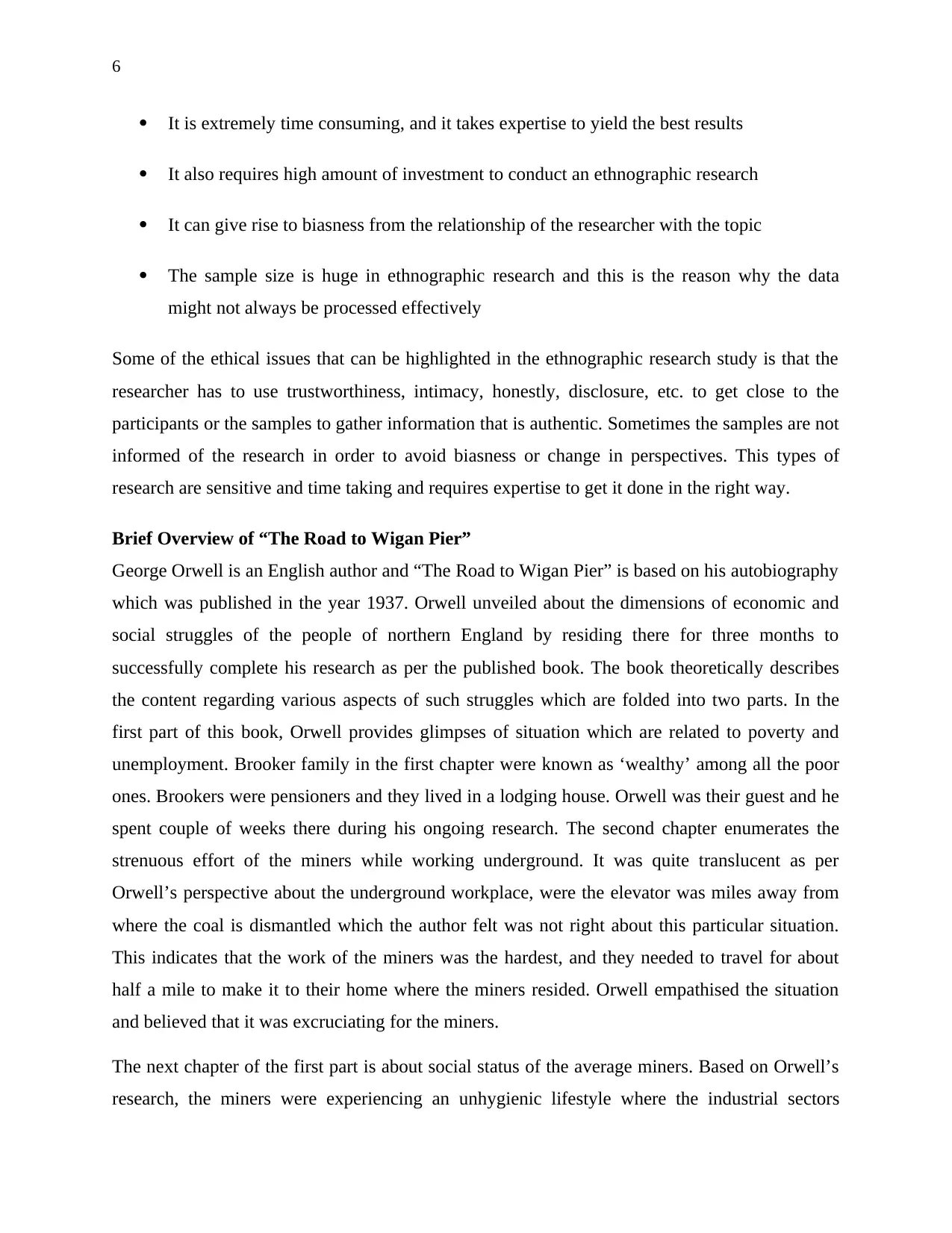
6
It is extremely time consuming, and it takes expertise to yield the best results
It also requires high amount of investment to conduct an ethnographic research
It can give rise to biasness from the relationship of the researcher with the topic
The sample size is huge in ethnographic research and this is the reason why the data
might not always be processed effectively
Some of the ethical issues that can be highlighted in the ethnographic research study is that the
researcher has to use trustworthiness, intimacy, honestly, disclosure, etc. to get close to the
participants or the samples to gather information that is authentic. Sometimes the samples are not
informed of the research in order to avoid biasness or change in perspectives. This types of
research are sensitive and time taking and requires expertise to get it done in the right way.
Brief Overview of “The Road to Wigan Pier”
George Orwell is an English author and “The Road to Wigan Pier” is based on his autobiography
which was published in the year 1937. Orwell unveiled about the dimensions of economic and
social struggles of the people of northern England by residing there for three months to
successfully complete his research as per the published book. The book theoretically describes
the content regarding various aspects of such struggles which are folded into two parts. In the
first part of this book, Orwell provides glimpses of situation which are related to poverty and
unemployment. Brooker family in the first chapter were known as ‘wealthy’ among all the poor
ones. Brookers were pensioners and they lived in a lodging house. Orwell was their guest and he
spent couple of weeks there during his ongoing research. The second chapter enumerates the
strenuous effort of the miners while working underground. It was quite translucent as per
Orwell’s perspective about the underground workplace, were the elevator was miles away from
where the coal is dismantled which the author felt was not right about this particular situation.
This indicates that the work of the miners was the hardest, and they needed to travel for about
half a mile to make it to their home where the miners resided. Orwell empathised the situation
and believed that it was excruciating for the miners.
The next chapter of the first part is about social status of the average miners. Based on Orwell’s
research, the miners were experiencing an unhygienic lifestyle where the industrial sectors
It is extremely time consuming, and it takes expertise to yield the best results
It also requires high amount of investment to conduct an ethnographic research
It can give rise to biasness from the relationship of the researcher with the topic
The sample size is huge in ethnographic research and this is the reason why the data
might not always be processed effectively
Some of the ethical issues that can be highlighted in the ethnographic research study is that the
researcher has to use trustworthiness, intimacy, honestly, disclosure, etc. to get close to the
participants or the samples to gather information that is authentic. Sometimes the samples are not
informed of the research in order to avoid biasness or change in perspectives. This types of
research are sensitive and time taking and requires expertise to get it done in the right way.
Brief Overview of “The Road to Wigan Pier”
George Orwell is an English author and “The Road to Wigan Pier” is based on his autobiography
which was published in the year 1937. Orwell unveiled about the dimensions of economic and
social struggles of the people of northern England by residing there for three months to
successfully complete his research as per the published book. The book theoretically describes
the content regarding various aspects of such struggles which are folded into two parts. In the
first part of this book, Orwell provides glimpses of situation which are related to poverty and
unemployment. Brooker family in the first chapter were known as ‘wealthy’ among all the poor
ones. Brookers were pensioners and they lived in a lodging house. Orwell was their guest and he
spent couple of weeks there during his ongoing research. The second chapter enumerates the
strenuous effort of the miners while working underground. It was quite translucent as per
Orwell’s perspective about the underground workplace, were the elevator was miles away from
where the coal is dismantled which the author felt was not right about this particular situation.
This indicates that the work of the miners was the hardest, and they needed to travel for about
half a mile to make it to their home where the miners resided. Orwell empathised the situation
and believed that it was excruciating for the miners.
The next chapter of the first part is about social status of the average miners. Based on Orwell’s
research, the miners were experiencing an unhygienic lifestyle where the industrial sectors
⊘ This is a preview!⊘
Do you want full access?
Subscribe today to unlock all pages.

Trusted by 1+ million students worldwide
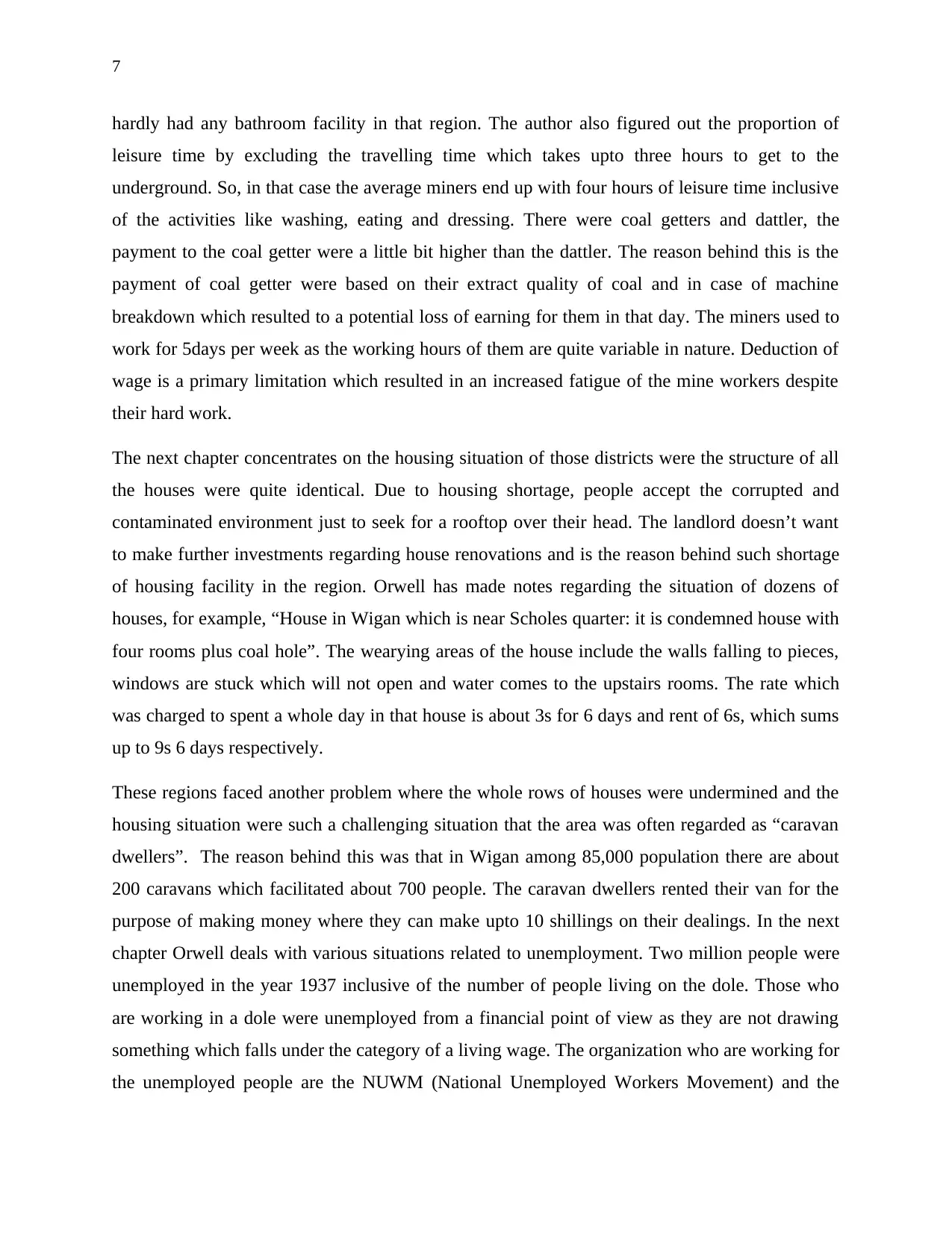
7
hardly had any bathroom facility in that region. The author also figured out the proportion of
leisure time by excluding the travelling time which takes upto three hours to get to the
underground. So, in that case the average miners end up with four hours of leisure time inclusive
of the activities like washing, eating and dressing. There were coal getters and dattler, the
payment to the coal getter were a little bit higher than the dattler. The reason behind this is the
payment of coal getter were based on their extract quality of coal and in case of machine
breakdown which resulted to a potential loss of earning for them in that day. The miners used to
work for 5days per week as the working hours of them are quite variable in nature. Deduction of
wage is a primary limitation which resulted in an increased fatigue of the mine workers despite
their hard work.
The next chapter concentrates on the housing situation of those districts were the structure of all
the houses were quite identical. Due to housing shortage, people accept the corrupted and
contaminated environment just to seek for a rooftop over their head. The landlord doesn’t want
to make further investments regarding house renovations and is the reason behind such shortage
of housing facility in the region. Orwell has made notes regarding the situation of dozens of
houses, for example, “House in Wigan which is near Scholes quarter: it is condemned house with
four rooms plus coal hole”. The wearying areas of the house include the walls falling to pieces,
windows are stuck which will not open and water comes to the upstairs rooms. The rate which
was charged to spent a whole day in that house is about 3s for 6 days and rent of 6s, which sums
up to 9s 6 days respectively.
These regions faced another problem where the whole rows of houses were undermined and the
housing situation were such a challenging situation that the area was often regarded as “caravan
dwellers”. The reason behind this was that in Wigan among 85,000 population there are about
200 caravans which facilitated about 700 people. The caravan dwellers rented their van for the
purpose of making money where they can make upto 10 shillings on their dealings. In the next
chapter Orwell deals with various situations related to unemployment. Two million people were
unemployed in the year 1937 inclusive of the number of people living on the dole. Those who
are working in a dole were unemployed from a financial point of view as they are not drawing
something which falls under the category of a living wage. The organization who are working for
the unemployed people are the NUWM (National Unemployed Workers Movement) and the
hardly had any bathroom facility in that region. The author also figured out the proportion of
leisure time by excluding the travelling time which takes upto three hours to get to the
underground. So, in that case the average miners end up with four hours of leisure time inclusive
of the activities like washing, eating and dressing. There were coal getters and dattler, the
payment to the coal getter were a little bit higher than the dattler. The reason behind this is the
payment of coal getter were based on their extract quality of coal and in case of machine
breakdown which resulted to a potential loss of earning for them in that day. The miners used to
work for 5days per week as the working hours of them are quite variable in nature. Deduction of
wage is a primary limitation which resulted in an increased fatigue of the mine workers despite
their hard work.
The next chapter concentrates on the housing situation of those districts were the structure of all
the houses were quite identical. Due to housing shortage, people accept the corrupted and
contaminated environment just to seek for a rooftop over their head. The landlord doesn’t want
to make further investments regarding house renovations and is the reason behind such shortage
of housing facility in the region. Orwell has made notes regarding the situation of dozens of
houses, for example, “House in Wigan which is near Scholes quarter: it is condemned house with
four rooms plus coal hole”. The wearying areas of the house include the walls falling to pieces,
windows are stuck which will not open and water comes to the upstairs rooms. The rate which
was charged to spent a whole day in that house is about 3s for 6 days and rent of 6s, which sums
up to 9s 6 days respectively.
These regions faced another problem where the whole rows of houses were undermined and the
housing situation were such a challenging situation that the area was often regarded as “caravan
dwellers”. The reason behind this was that in Wigan among 85,000 population there are about
200 caravans which facilitated about 700 people. The caravan dwellers rented their van for the
purpose of making money where they can make upto 10 shillings on their dealings. In the next
chapter Orwell deals with various situations related to unemployment. Two million people were
unemployed in the year 1937 inclusive of the number of people living on the dole. Those who
are working in a dole were unemployed from a financial point of view as they are not drawing
something which falls under the category of a living wage. The organization who are working for
the unemployed people are the NUWM (National Unemployed Workers Movement) and the
Paraphrase This Document
Need a fresh take? Get an instant paraphrase of this document with our AI Paraphraser
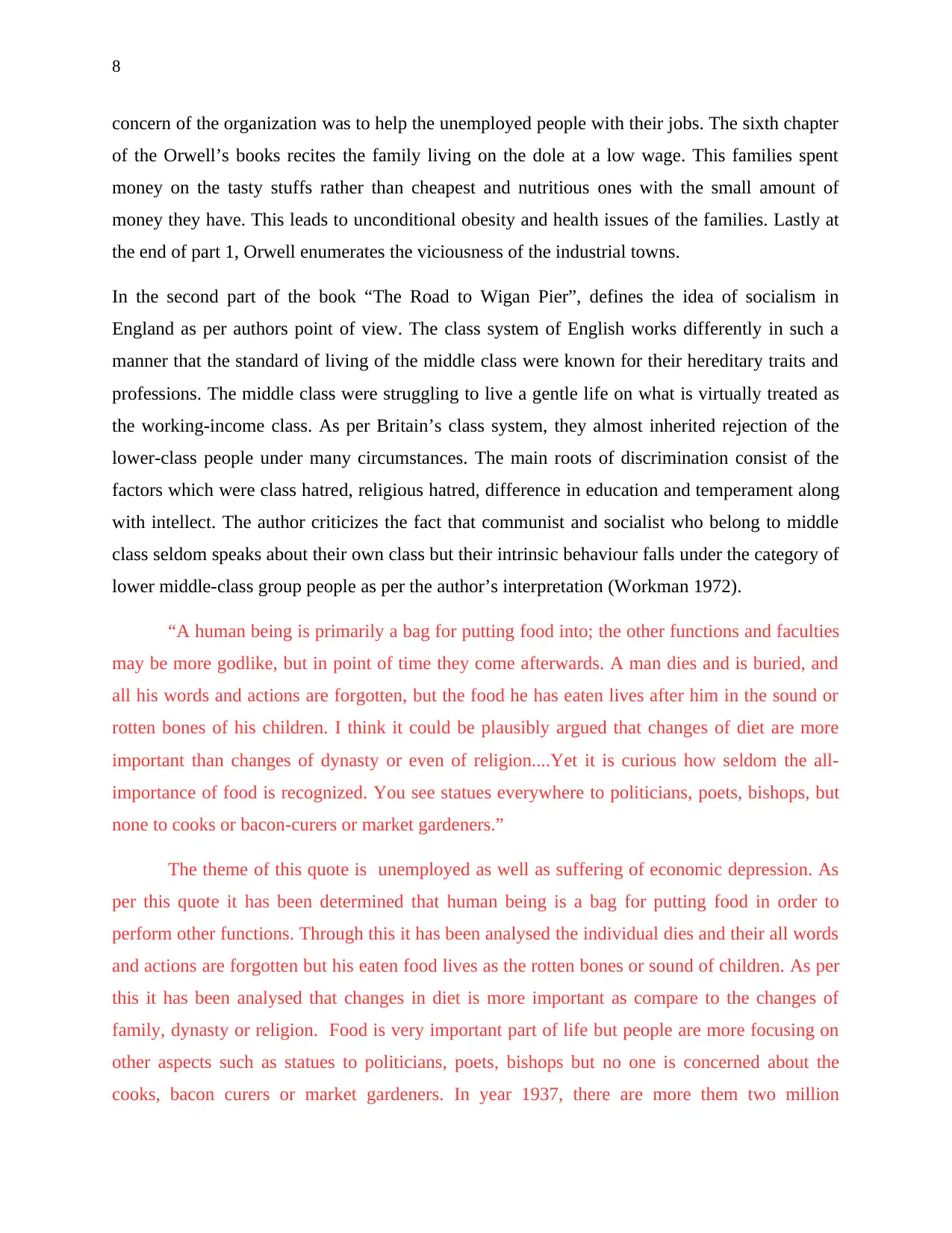
8
concern of the organization was to help the unemployed people with their jobs. The sixth chapter
of the Orwell’s books recites the family living on the dole at a low wage. This families spent
money on the tasty stuffs rather than cheapest and nutritious ones with the small amount of
money they have. This leads to unconditional obesity and health issues of the families. Lastly at
the end of part 1, Orwell enumerates the viciousness of the industrial towns.
In the second part of the book “The Road to Wigan Pier”, defines the idea of socialism in
England as per authors point of view. The class system of English works differently in such a
manner that the standard of living of the middle class were known for their hereditary traits and
professions. The middle class were struggling to live a gentle life on what is virtually treated as
the working-income class. As per Britain’s class system, they almost inherited rejection of the
lower-class people under many circumstances. The main roots of discrimination consist of the
factors which were class hatred, religious hatred, difference in education and temperament along
with intellect. The author criticizes the fact that communist and socialist who belong to middle
class seldom speaks about their own class but their intrinsic behaviour falls under the category of
lower middle-class group people as per the author’s interpretation (Workman 1972).
“A human being is primarily a bag for putting food into; the other functions and faculties
may be more godlike, but in point of time they come afterwards. A man dies and is buried, and
all his words and actions are forgotten, but the food he has eaten lives after him in the sound or
rotten bones of his children. I think it could be plausibly argued that changes of diet are more
important than changes of dynasty or even of religion....Yet it is curious how seldom the all-
importance of food is recognized. You see statues everywhere to politicians, poets, bishops, but
none to cooks or bacon-curers or market gardeners.”
The theme of this quote is unemployed as well as suffering of economic depression. As
per this quote it has been determined that human being is a bag for putting food in order to
perform other functions. Through this it has been analysed the individual dies and their all words
and actions are forgotten but his eaten food lives as the rotten bones or sound of children. As per
this it has been analysed that changes in diet is more important as compare to the changes of
family, dynasty or religion. Food is very important part of life but people are more focusing on
other aspects such as statues to politicians, poets, bishops but no one is concerned about the
cooks, bacon curers or market gardeners. In year 1937, there are more them two million
concern of the organization was to help the unemployed people with their jobs. The sixth chapter
of the Orwell’s books recites the family living on the dole at a low wage. This families spent
money on the tasty stuffs rather than cheapest and nutritious ones with the small amount of
money they have. This leads to unconditional obesity and health issues of the families. Lastly at
the end of part 1, Orwell enumerates the viciousness of the industrial towns.
In the second part of the book “The Road to Wigan Pier”, defines the idea of socialism in
England as per authors point of view. The class system of English works differently in such a
manner that the standard of living of the middle class were known for their hereditary traits and
professions. The middle class were struggling to live a gentle life on what is virtually treated as
the working-income class. As per Britain’s class system, they almost inherited rejection of the
lower-class people under many circumstances. The main roots of discrimination consist of the
factors which were class hatred, religious hatred, difference in education and temperament along
with intellect. The author criticizes the fact that communist and socialist who belong to middle
class seldom speaks about their own class but their intrinsic behaviour falls under the category of
lower middle-class group people as per the author’s interpretation (Workman 1972).
“A human being is primarily a bag for putting food into; the other functions and faculties
may be more godlike, but in point of time they come afterwards. A man dies and is buried, and
all his words and actions are forgotten, but the food he has eaten lives after him in the sound or
rotten bones of his children. I think it could be plausibly argued that changes of diet are more
important than changes of dynasty or even of religion....Yet it is curious how seldom the all-
importance of food is recognized. You see statues everywhere to politicians, poets, bishops, but
none to cooks or bacon-curers or market gardeners.”
The theme of this quote is unemployed as well as suffering of economic depression. As
per this quote it has been determined that human being is a bag for putting food in order to
perform other functions. Through this it has been analysed the individual dies and their all words
and actions are forgotten but his eaten food lives as the rotten bones or sound of children. As per
this it has been analysed that changes in diet is more important as compare to the changes of
family, dynasty or religion. Food is very important part of life but people are more focusing on
other aspects such as statues to politicians, poets, bishops but no one is concerned about the
cooks, bacon curers or market gardeners. In year 1937, there are more them two million
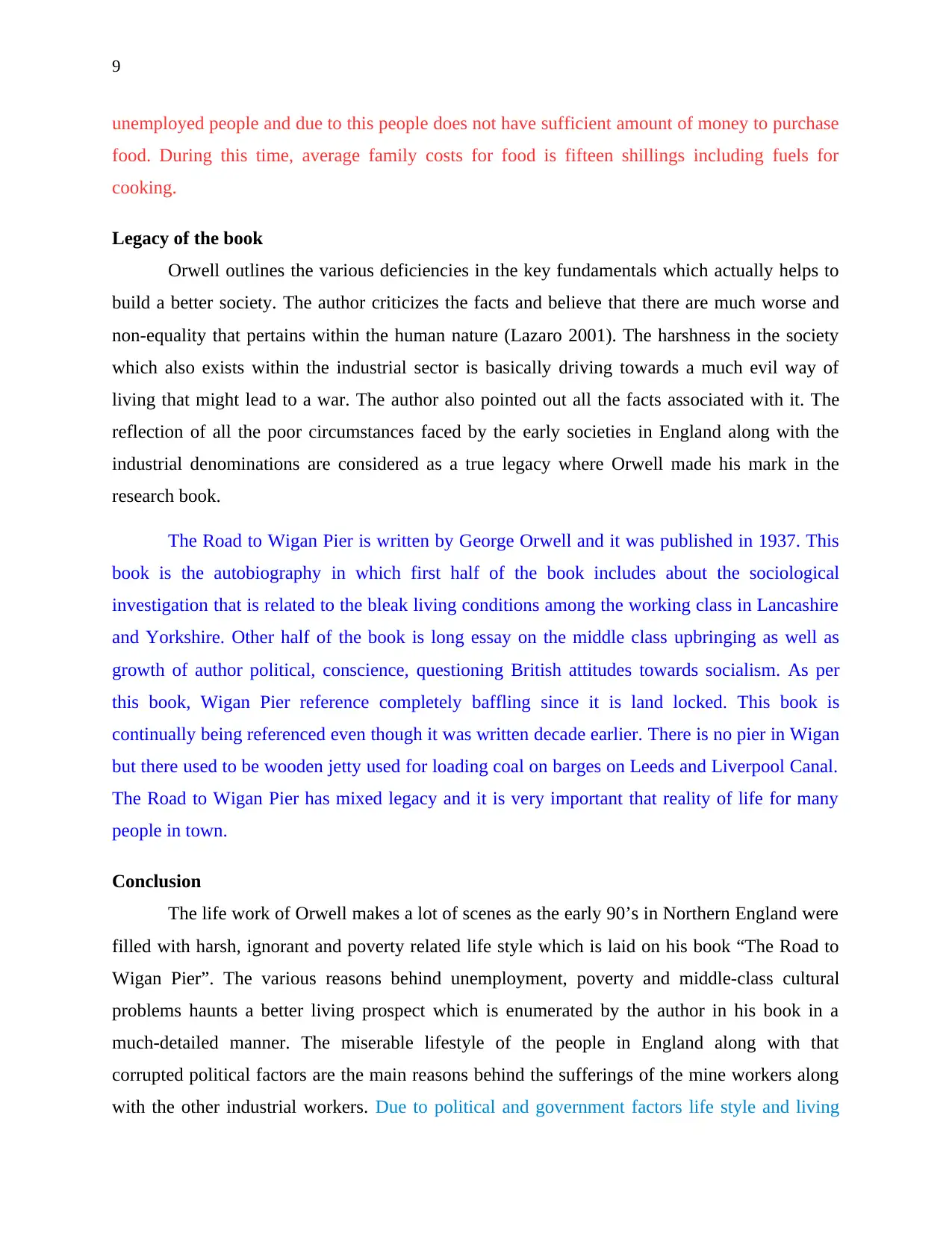
9
unemployed people and due to this people does not have sufficient amount of money to purchase
food. During this time, average family costs for food is fifteen shillings including fuels for
cooking.
Legacy of the book
Orwell outlines the various deficiencies in the key fundamentals which actually helps to
build a better society. The author criticizes the facts and believe that there are much worse and
non-equality that pertains within the human nature (Lazaro 2001). The harshness in the society
which also exists within the industrial sector is basically driving towards a much evil way of
living that might lead to a war. The author also pointed out all the facts associated with it. The
reflection of all the poor circumstances faced by the early societies in England along with the
industrial denominations are considered as a true legacy where Orwell made his mark in the
research book.
The Road to Wigan Pier is written by George Orwell and it was published in 1937. This
book is the autobiography in which first half of the book includes about the sociological
investigation that is related to the bleak living conditions among the working class in Lancashire
and Yorkshire. Other half of the book is long essay on the middle class upbringing as well as
growth of author political, conscience, questioning British attitudes towards socialism. As per
this book, Wigan Pier reference completely baffling since it is land locked. This book is
continually being referenced even though it was written decade earlier. There is no pier in Wigan
but there used to be wooden jetty used for loading coal on barges on Leeds and Liverpool Canal.
The Road to Wigan Pier has mixed legacy and it is very important that reality of life for many
people in town.
Conclusion
The life work of Orwell makes a lot of scenes as the early 90’s in Northern England were
filled with harsh, ignorant and poverty related life style which is laid on his book “The Road to
Wigan Pier”. The various reasons behind unemployment, poverty and middle-class cultural
problems haunts a better living prospect which is enumerated by the author in his book in a
much-detailed manner. The miserable lifestyle of the people in England along with that
corrupted political factors are the main reasons behind the sufferings of the mine workers along
with the other industrial workers. Due to political and government factors life style and living
unemployed people and due to this people does not have sufficient amount of money to purchase
food. During this time, average family costs for food is fifteen shillings including fuels for
cooking.
Legacy of the book
Orwell outlines the various deficiencies in the key fundamentals which actually helps to
build a better society. The author criticizes the facts and believe that there are much worse and
non-equality that pertains within the human nature (Lazaro 2001). The harshness in the society
which also exists within the industrial sector is basically driving towards a much evil way of
living that might lead to a war. The author also pointed out all the facts associated with it. The
reflection of all the poor circumstances faced by the early societies in England along with the
industrial denominations are considered as a true legacy where Orwell made his mark in the
research book.
The Road to Wigan Pier is written by George Orwell and it was published in 1937. This
book is the autobiography in which first half of the book includes about the sociological
investigation that is related to the bleak living conditions among the working class in Lancashire
and Yorkshire. Other half of the book is long essay on the middle class upbringing as well as
growth of author political, conscience, questioning British attitudes towards socialism. As per
this book, Wigan Pier reference completely baffling since it is land locked. This book is
continually being referenced even though it was written decade earlier. There is no pier in Wigan
but there used to be wooden jetty used for loading coal on barges on Leeds and Liverpool Canal.
The Road to Wigan Pier has mixed legacy and it is very important that reality of life for many
people in town.
Conclusion
The life work of Orwell makes a lot of scenes as the early 90’s in Northern England were
filled with harsh, ignorant and poverty related life style which is laid on his book “The Road to
Wigan Pier”. The various reasons behind unemployment, poverty and middle-class cultural
problems haunts a better living prospect which is enumerated by the author in his book in a
much-detailed manner. The miserable lifestyle of the people in England along with that
corrupted political factors are the main reasons behind the sufferings of the mine workers along
with the other industrial workers. Due to political and government factors life style and living
⊘ This is a preview!⊘
Do you want full access?
Subscribe today to unlock all pages.

Trusted by 1+ million students worldwide
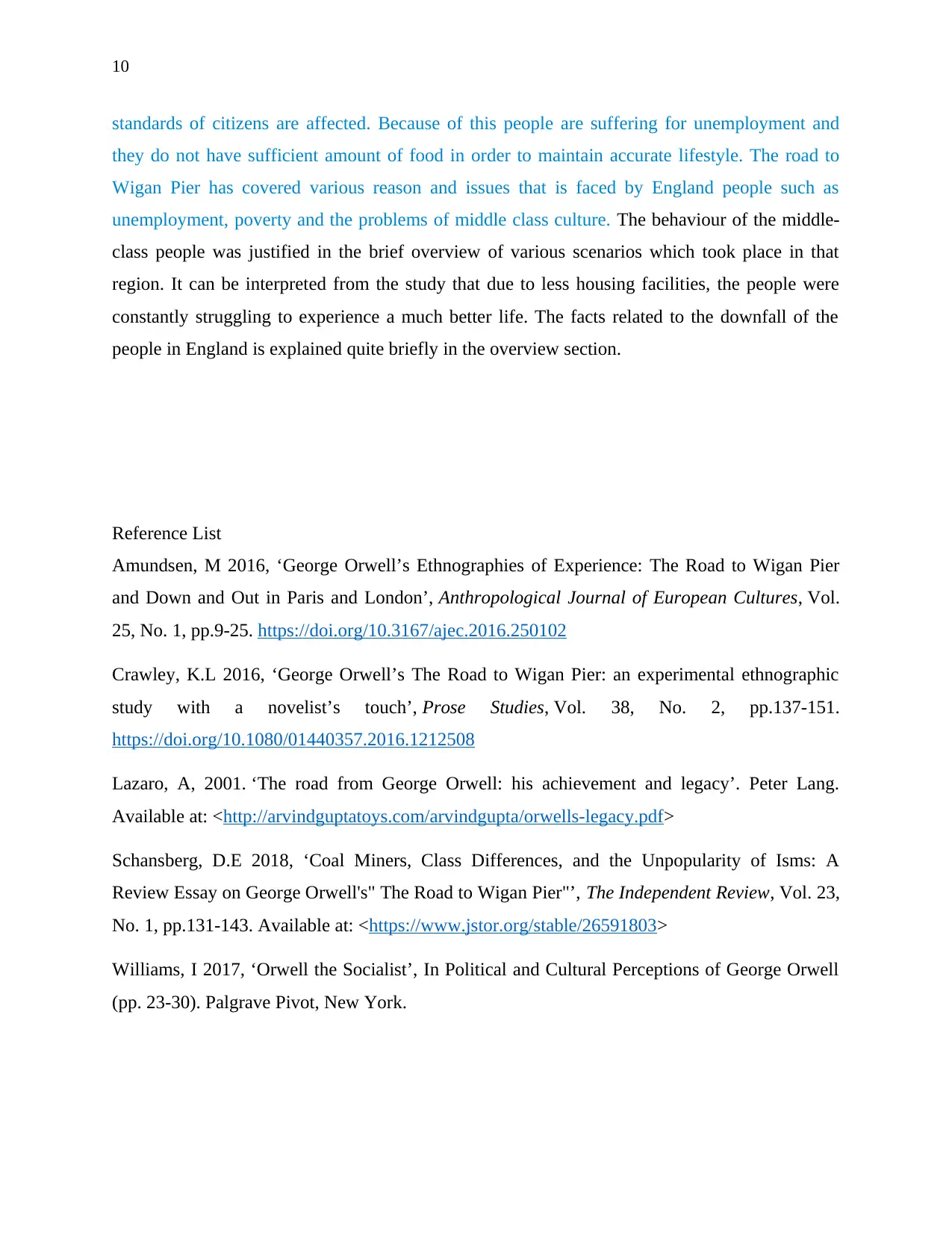
10
standards of citizens are affected. Because of this people are suffering for unemployment and
they do not have sufficient amount of food in order to maintain accurate lifestyle. The road to
Wigan Pier has covered various reason and issues that is faced by England people such as
unemployment, poverty and the problems of middle class culture. The behaviour of the middle-
class people was justified in the brief overview of various scenarios which took place in that
region. It can be interpreted from the study that due to less housing facilities, the people were
constantly struggling to experience a much better life. The facts related to the downfall of the
people in England is explained quite briefly in the overview section.
Reference List
Amundsen, M 2016, ‘George Orwell’s Ethnographies of Experience: The Road to Wigan Pier
and Down and Out in Paris and London’, Anthropological Journal of European Cultures, Vol.
25, No. 1, pp.9-25. https://doi.org/10.3167/ajec.2016.250102
Crawley, K.L 2016, ‘George Orwell’s The Road to Wigan Pier: an experimental ethnographic
study with a novelist’s touch’, Prose Studies, Vol. 38, No. 2, pp.137-151.
https://doi.org/10.1080/01440357.2016.1212508
Lazaro, A, 2001. ‘The road from George Orwell: his achievement and legacy’. Peter Lang.
Available at: <http://arvindguptatoys.com/arvindgupta/orwells-legacy.pdf>
Schansberg, D.E 2018, ‘Coal Miners, Class Differences, and the Unpopularity of Isms: A
Review Essay on George Orwell's" The Road to Wigan Pier"’, The Independent Review, Vol. 23,
No. 1, pp.131-143. Available at: <https://www.jstor.org/stable/26591803>
Williams, I 2017, ‘Orwell the Socialist’, In Political and Cultural Perceptions of George Orwell
(pp. 23-30). Palgrave Pivot, New York.
standards of citizens are affected. Because of this people are suffering for unemployment and
they do not have sufficient amount of food in order to maintain accurate lifestyle. The road to
Wigan Pier has covered various reason and issues that is faced by England people such as
unemployment, poverty and the problems of middle class culture. The behaviour of the middle-
class people was justified in the brief overview of various scenarios which took place in that
region. It can be interpreted from the study that due to less housing facilities, the people were
constantly struggling to experience a much better life. The facts related to the downfall of the
people in England is explained quite briefly in the overview section.
Reference List
Amundsen, M 2016, ‘George Orwell’s Ethnographies of Experience: The Road to Wigan Pier
and Down and Out in Paris and London’, Anthropological Journal of European Cultures, Vol.
25, No. 1, pp.9-25. https://doi.org/10.3167/ajec.2016.250102
Crawley, K.L 2016, ‘George Orwell’s The Road to Wigan Pier: an experimental ethnographic
study with a novelist’s touch’, Prose Studies, Vol. 38, No. 2, pp.137-151.
https://doi.org/10.1080/01440357.2016.1212508
Lazaro, A, 2001. ‘The road from George Orwell: his achievement and legacy’. Peter Lang.
Available at: <http://arvindguptatoys.com/arvindgupta/orwells-legacy.pdf>
Schansberg, D.E 2018, ‘Coal Miners, Class Differences, and the Unpopularity of Isms: A
Review Essay on George Orwell's" The Road to Wigan Pier"’, The Independent Review, Vol. 23,
No. 1, pp.131-143. Available at: <https://www.jstor.org/stable/26591803>
Williams, I 2017, ‘Orwell the Socialist’, In Political and Cultural Perceptions of George Orwell
(pp. 23-30). Palgrave Pivot, New York.
Paraphrase This Document
Need a fresh take? Get an instant paraphrase of this document with our AI Paraphraser

11
Workman, G, 1972. Orwell Criticism. ARIEL: A Review of International English
Literature, Vol. 3, No. 1, Available at:
<http://cdm.ucalgary.ca/index.php/ariel/article/view/31779/25852>
Workman, G, 1972. Orwell Criticism. ARIEL: A Review of International English
Literature, Vol. 3, No. 1, Available at:
<http://cdm.ucalgary.ca/index.php/ariel/article/view/31779/25852>
1 out of 11
Related Documents
Your All-in-One AI-Powered Toolkit for Academic Success.
+13062052269
info@desklib.com
Available 24*7 on WhatsApp / Email
![[object Object]](/_next/static/media/star-bottom.7253800d.svg)
Unlock your academic potential
Copyright © 2020–2025 A2Z Services. All Rights Reserved. Developed and managed by ZUCOL.





